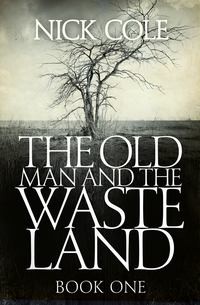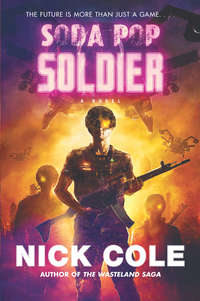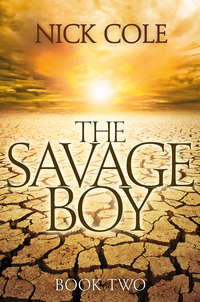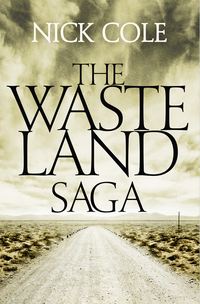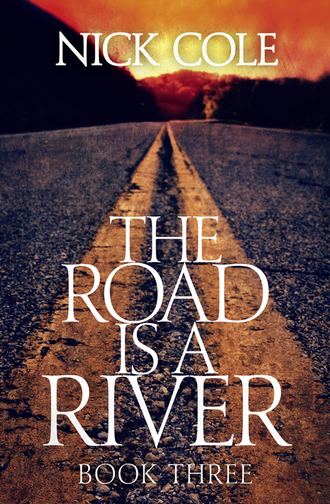
Полная версия
The Road is a River
“Anything would be appreciated. To tell you the truth …”
Words refused to come.
His granddaughter disappeared off into the place where she had been born and where they had lived their entire lives until recently.
I thought we would always live here. I was happy here.
“I almost felt …” said the Old Man.
“Like it was too much?” the General asked.
“Yes,” whispered the Old Man.
“I understand that too,” said the General.
The Old Man felt tired. Felt like he could let go of a burden he’d never remembered picking up but had been carrying for longer than he could remember.
“I brought my granddaughter with me. She’s just thirteen years old. I was afraid this would be too much for just the two of us.”
“But you will continue?”
“Yes.”
“If you weren’t afraid, I’d be concerned you were some kind of idiot.”
The Old Man watched his granddaughter run from one shack to another, flinging open doors in the morning light, dust motes swirling about her.
“I won’t lie to you,” said General Watt. “What you’re heading into is very dangerous. If you turned off this radio and went home and never answered it again … I would understand. I have children and grandchildren too. But please don’t.”
“I’m sorry,” said the Old Man.
“Don’t be. If you knew my story, you would know that when I was … let’s just say it was never considered possible for me to have children. But I have them and they are mine now. I will do everything I can to save them. Sadly, I have done everything and it isn’t enough to overcome the one problem we’ve faced since the mountain above us collapsed down onto our emergency exit. You sound like a good man. Maybe if there had been more like you back before the war, we wouldn’t be stuck here now.”
“I was only twenty-seven then,” said the Old Man. Static rose like a sudden ocean wave cresting and then falling violently onto the shore.
“I know what I’m asking you to do is beyond … reason. But I have to. You are our last hope. My grandchildren’s last hope.”
The Old Man wiped a sudden hot tear of shame from his eye.
“Don’t worry, we’ll get you out of there,” he said.
Static.
“Thank you,” said General Watt just before a storm of white noise consumed her voice.
Chapter Eleven
The Old Man turned to look at the village one last time as it disappeared on the far horizon behind them. The desert, a sandy plain dotted by dry mesquite growing low and close to the ground, swallowed the village and replaced it with more, an endless-seeming supply of itself.
I will never see my village again.
He let the whispering roar of the turbine overwhelm his thoughts, disintegrate them, and turn them into fuel to be spat out the back of the lumbering tank.
You don’t know that. Good things and adventures might be just ahead.
Like what?
The noise of the tank filled the Old Man’s thoughts as he waited, trying to imagine what good could possibly come of this journey. He could think of nothing.
Rivers, my friend. Rivers that must lead to an ocean.
I cannot remember when I last saw a river. A river—to be on a raft and to float and to fish … that would be heaven. There are no rivers in the desert. Only riverbeds.
Maybe we will find a river and we can make a raft, my friend. She would like that.
“Grandpa,” came her high voice over the intercom as they jounced off-road. The interstate was damaged and the outermost remains of the Great Wreck were beginning to clog the highway.
I wonder if my car is still here.
Of course it is, where would it have gone?
True.
Before him the Great Wreck, as they’d called it all those years, lay spreading in every direction. In the distance he could see where the two broken semis that had collided and overturned formed the epicenter. From there rusting cargo vans and sinking station wagons had tumbled away down the road or off into the nearby desert, torn to pieces by the remorseless forces of fearful momentum meeting sudden obstacles. Other cars, hundreds of others, had driven off into the thick sand, becoming stuck as still more and more vehicles, unseen from the Old Man’s vantage point, had continued to hurtle themselves into the wall of destruction as they fled the nuclear fireball over Yuma. On that last long-ago day everything had been smoke and screams and rending metal and people rushing away to the east and the fireball in the west where Yuma had once been. Now it was quiet and rusty and sinking year by year into the soft piles of sand that were dunes marching east.
“Yes?”
“Why did you change your mind about going back?”
The Old Man maneuvered the left stick to avoid a rusting station wagon that had fallen backward off the road. The tank clipped the front end and crushed it before the Old Man could adjust their direction.
“Because they need our help and because we must always help one another.”
“Even strangers, Grandpa?”
But the Old Man did not answer as he edged the tank closer to the massive destruction of the Great Wreck.
“Let’s stretch our legs for a moment and see how we might get around all these old cars and trucks.”
They walked a ways from the rumbling tank, heading toward the massive wall of rusting and smashed vehicles that had piled up just beyond the last valley.
It’s like coming home … but that doesn’t seem right does it?
No, it doesn’t. But it all began here. Here was the day after. After what I had once been or was becoming. I can’t even remember now. But it was here on that last day when my car died.
“What happened here, Grandpa?”
“Most of the people you know in the village, we all met here on the day of the bombs.”
“Did you plan to meet? Like did you know one another before the world ended?”
Before the world ended. That must seem like a strange phrase to her. Strange because the world has gone on.
“No. We were just all here on that day. Or we met on the one that followed as we walked east away from the bombs.”
“What was it like?”
The Old Man looked at the two semis around which most of the wreckage centered.
I remember all of us getting out of our cars, trapped by the wreck, turning to see the mushroom cloud rising in the distance over Yuma behind us. I remember a woman screaming and then crying. Men were shouting.
“There was ash and dust. Fires on the horizons. Everyone was afraid.”
Like we’d done something wrong. Broken something that could never be replaced. Committed an unpardonable crime.
“Were you afraid, Grandpa?”
“I can’t remember.”
She laughed.
He took out the map he’d found in the library.
“We can’t go into Yuma. It’s too hot from the bomb I saw go off there. But if we cut through those plains off to the north, we should pick up the old road heading to the Fort. I found that radio along the road leading there.”
“Can I drive?”
“Not yet, you’re still too small.”
“There’s another compartment in front of the tank with a couch where you lie down with a handlebar like a motorcycle. I sat in it, Grandpa.”
“Could you reach the pedals?”
“Sort of, yes.”
“Soon, though. Soon.”
“Yes, soon.”
Rusting cars, bashed and torn, crushed by careening fear-driven freight-laden semis with drivers who had watched the world end in their rearview mirrors, remained, spreading across the blistered road.
Into the desert.
Underneath the sand.
Rusting destruction piled long ago during the end of the world.
Chapter Twelve
“This is General Watt calling.”
“We’re here,” said the Old Man into his mic after a moment of fumbling with the communications system.
“I have some good news,” she said as a static squall crested and then was gone.
The Old Man stopped the tank.
They were on a small rise far out in the bowl of the desert. Somewhere within all the brown dust ahead lay the Proving Ground, the military base north of Yuma the villagers had avoided simply because it shared the same name of another place they had all seen destroyed.
I feel I don’t know everything I need to know about what we’re doing. But what am I supposed to ask her? This person, this General, she could be keeping the truth from me. And the others, Pancho, they could have been right all along.
For now, you must play the game according to its rules, my friend.
Maybe I should turn back.
“Our installation keeps a record of all the communications we tracked before the nets went completely offline. I’ve conducted a data search and found that a convoy carrying JP-9 arrived in the Yuma Proving Ground a week before the city of Yuma was destroyed. There is a chance that you may find the remains of that convoy somewhere within the facility.”
“Would this JP-9 be usable? It’s been forty years,” asked the Old Man.
“If it still exists, then theoretically, yes. JP-9 was a prototype fuel rushed into production in the lead-up to the war. The Defense Department officials foresaw the need for a long-shelf-life fuel replacement and ordered as much of it as they were able to in the months prior to the war. There were some concerns over its use, but at this stage, it might be your only option. Unless someone took the time to use fuel stabilizers and conduct an additive removal process, the chances of finding a completely airtight fuel source are highly improbable. Your only other option will be clean diesel or kerosene. Again, these are not optimal sources, but the M-1 Abrams Main Battle Tank uses a multifuel vehicle system.”
“What will these tankers look like?”
“They resemble standard military fuel transports and there should be twelve of them. JP-9 had a projected eighty-year shelf life. Though this was never tested, reports indicate the lifespan was achievable.”
Our whole journey depends on the word “reports.”
“All right then, we’ll try and find the tankers.”
The Old Man listened to the tank, letting the massive turbine idle in its screaming high-pitched drone as he scanned the horizon once more with his binoculars.
There is no sign of the Proving Ground. We are nearing the end of our fuel. Soon, I’ll have to pump our two fifty-gallon drums.
“Grandpa, below that mountain there’s a sign sticking out of the ground. Maybe we should go and see what’s written on it?”
It’s a good thing she has come with me; I never would’ve seen that sign.
“I can’t see the sign,” said the Old Man. “Where is it?”
“See that mountain, the low one off to our left that’s all shadowy and bumpy and rocky?”
“Yes.”
“Right in there.”
The Old Man found the sign through his binoculars but it was still too far away to read what, if anything at all, was still written upon it.
He took hold of the controls, pressed his foot onto the pedal slightly, and watched the terrain ahead. I have to keep the tank on the firmest ground. We cannot get stuck. If we do, there is no way to rescue the tank that I can think of right now.
Then maybe you will think of a way when you need to, my friend. Try not to worry about what has not happened to you. And may never happen at all.
“How did you see the sign?”
“I can make this target thing bigger with a dial on the side of it.”
“I don’t think we should touch those buttons. We don’t want to make the gun go off.”
“It also sees in the dark if you turn this knob,” she continued.
“You’re very smart. But we must be careful. We don’t know everything yet. Still, you’re very smart and I am proud of you. Much smarter than me.”
When they reached the sign, the Old Man got down off the tank as his granddaughter watched him from the hatch she’d learned to open on the side of the tank. Again a new thing she understood about the tank and which he hadn’t yet figured out.
The sign was sand scoured, and what words had once been written upon it were gone. But the Old Man could feel the hard remains of a road buried beneath the drifting sand under his boots. He took out his map and began to look around.
The Proving Ground must be that way. On the map they are north of Yuma.
There were people all alongside the highway that day, camped out, hoping to get to the airport, onto a plane, and flee. I remember the rumor that airplanes were waiting to take us all somewhere safe.
I remember wanting to believe the rumor was true, which is the terrible thing about rumors.
In his mind he could see Air Force One floating across the sky. Black smoke trailed from one of its engines, coming in to land one last time.
That was a long time ago.
Concentrate! That last day doesn’t have anything to do with today. Today you must find these trucks that contain the fuel. If you don’t find them, then you have failed.
The Old Man climbed back into the tank and checked the dosimeter.
The needle is still within the green, so we must be far enough away from Yuma to avoid its radiation.
Are you asking or hoping, my friend? Because all your hoping and asking depends on whether the weather compass that is your dosimeter still works.
They followed the mostly buried road as best they could. As it rounded the craggy hill his granddaughter had called a mountain, ahead of them ran the fading, spider silk line of a highway, and off in the distance, the Old Man could see buildings.
“Can you see those building through the target scope?” asked the Old Man.
“Gimme a second, Grandpa.”
Suddenly the turret began to rotate as the gun barrel came to rest on the far horizon.
In every moment she figures out some new thing.
“Yes, they’re brown and dirty. Low and flat.”
“Do you see the tankers we’re looking for?”
After a moment she said, “No. They’re not there.”
The Old Man waited, watching the tiny buildings shimmer in the heat of the fading afternoon.
“Do you see any people?”
“No. There’s no one there.”
The needle in the fuel gauge hovered just above empty when the Old Man finally shut down the tank amid the silent buildings being swallowed by the first low dunes of sand.
If we don’t find these fuel tankers soon, I’ll need to pump the drums and head back to Tucson.
He took his crowbar and exited the hatch stiffly, his granddaughter already lowering herself down onto the intersection they’d stopped in.
Flat, dust-brown uniform buildings from a different era stretched off in orderly lines down quiet, sand-swept streets. Murky windows hid what lay within. The air was dry and hot.
Signs and street markings had been scoured to meaninglessness. The outlines of once-lawns were everywhere. Within their borders, brown weeds withered under the final waves of the day’s heat.
“Hello,” the Old Man called out into the silence.
There was no reply and his voice was swallowed by the soft quiet of the dunes.
“It’s spooky, Grandpa. I don’t think anyone has been here for a long time.”
They searched the small streets for any sign of the tankers. But there weren’t any vehicles, of any kind.
Inside buildings they found dust-covered museums of life as it had once been. Coffee mugs forever waiting to be picked up lay next to piles of yellowed and desiccating paperwork on dry desks that felt sapped of any sturdiness they’d once possessed.
When the Old Man picked up a newspaper it came apart, and he was left holding only a few feathery scraps. He tried to read the paperwork without touching it. But anything meaningful was lost in a haze of military jargon that he could not understand. He scanned for the words “fuel” or “tankers.”
There is no mention of either.
Outside, the day was turning to orange as the sun sank into the dusty west. Gray shadows threw themselves away from the flat military buildings. A light breeze came and shifted the sand a little closer to the surrendering outpost.
“So what do we do now, Grandpa?”
The Old Man stood in front of the largest building.
Probably the headquarters. They picked an idiot. They picked an idiot to come and rescue them. Remember the curse of the hot radio.
The Old Man walked back to the tank. He felt stupid and useless.
It isn’t my fault the tankers aren’t here.
“We’ll camp outside tonight. It seems safe enough. In the morning, maybe we’ll have a new idea.”
“We’re not giving up, are we, Grandpa?”
“No, we won’t give up.”
She seemed relieved and soon she was back in the tank handing out their bags and sleeping gear for the night.
“Can we have a fire?”
“Yes.”
“A story?”
“Yes, of course.”
“A ghost story?”
“I don’t know any.”
“I do.”
“I don’t like them before I go to sleep.”
“Oh, Grandpa.” She snorted and laughed.
Later, when their gear was out and they’d made camp in front of the ancient headquarters building, clearing a space along the broad sidewalk that ran through the ghost of the once-lawn, she said, “This is the best salvage trip ever, Grandpa.”
“But we haven’t salvaged anything yet.”
“That doesn’t mean it’s not the best.”
“Yes, you’re right, it is the best.”
They ate food as the stars began to appear, as the sky turned from orange to purple, then from purple to deep blue.
Night.
The Old Man watched, listening to his granddaughter talk about the tank. He watched for the satellite above. The one that General Watt was using to talk to them.
The satellites are still up there crossing the sky.
Like me crossing this land.
Which is something, if you think about it.
In the night, long after she had drifted to sleep listening to him tell about the time he had seen the fox walking down the old highway, he awoke. The fire was low. There is nothing left to burn but the weeds of this old lawn. Unless I want to pull the boards off these buildings, but the sound would wake her. Besides, the night is warm enough.
The Old Man rose.
Because the ground is too hard and I need to pee. And also because I am not sleeping.
Tomorrow we will have to turn back. Without fuel, it’s just not possible to make it all the way. The tankers were most likely in Yuma, at the airport, when the bomb went off. Now, they are gone.
He tried to remember if he’d seen any such vehicles forty years ago on the last hot day of his country.
I can’t remember. She will be disappointed.
He turned and crossed the ancient outline of the weed-choked lawn, hearing the dry crunch beneath his feet.
Why would the Army have lawns in the desert?
I guess that was the way the military did things. They imposed order and rules regardless of the situation and location.
They were crazy to try to grow grass in the desert.
But they did. As long as they had water they must’ve grown these lawns. The world was crazy then.
We were all crazy.
And then he knew where he would find fuel. Or at least he hoped to. Excited, he drifted back to sleep for what remained of the night as though he had found a missing puzzle piece or remembered something good that would happen. Excited that he would not disappoint her. Excited that the best salvage trip ever might go on for at least one more day.
The best ever.
In the morning they found where the military kept its gardening equipment. Ancient rakes, rusty shovels and time frozen hedge trimmers. Dust-choked oily lawnmowers forever resting in dress-right-dress formation waited at the back of a large dark hangar. And off to one side, an immense storage tank of military-grade kerosene.
The Old Man drew off a little of the kerosene in a coffee mug he’d found in an office where clipboards hung neatly on the wall. He took it back outside as his granddaughter followed with questions, unsure of his game.
“Will it make the tank go, Grandpa?”
“If it’s still good, it might.”
The Old Man took a match from his pocket. He had loaded up on matches for this trip, remembering the last three matches inside the sewers beneath the hangar the wolves had chased him into. He struck the match and dropped it into the fuel. It caught and made a heavy chemical smell erupt in gray waves of smoke.
They rode the lumbering tank away, leaving the dry and dusty military post to itself and the years that must consume it. Off to the west, sand dunes rose in the afternoon heat.
Soon the sand dunes will arrive here as they march across the desert. Then they will cover this place and the kerosene that still remains inside that big storage tank.
But I will be gone by then.
Now we must hope there will be other fuel sources along the road. We may not find our river, my friend, but in a way the road is like that.
And what ocean will it lead to?
That night, the Old Man dreamed that he and Santiago were on a wide sea, under a hot sun, watching the flying fish leap from the water. Waiting for the big fish they would catch.
Chapter Thirteen
Ahead we will find places I once knew long ago and have forgotten since. And I can only imagine what time and the bombs have done to them. I can only imagine that my past memories have changed to present nightmares.
Yes, my friend.
The tank trundled down a long, dirty, brown slope. In the distance they could see a strand of Highway 10 cutting the landscape in two.
It too is still there.
His granddaughter, ahead in the separate compartment containing the driver’s couch, steered the tank across the crumbling dirt slope. Often he needed to remind her to slow down.
I feel like we’ve gone off the edge of something. The edge of everything we’ve ever known. Did you feel that way, Santiago, as you pulled at the oars farther and farther out into the gulf, watching the color of the water deepen until it was dark and not blue? Did you too feel like you were going off the edge of something?
And yet I knew it all once and long ago.
Memories of the cities of the West began to come and stand around the Old Man like mourners near an open grave.
You must forget all this melancholy and think only of the facts. You have enough fuel to reach China Lake. If you don’t find fuel there, then crossing Death Valley into Area 51, will be impossible. You must follow this road until you come to an old tactical outpost set up alongside the highway. General Watt told us we would find it there.
“Grandpa, there’s someone on the road ahead.”
The Old Man scanned the horizon.
Far to their right, in the direction they must go, he could see the dark silhouette of a human.
It stood, unmoving in the late heat of the day.
The Old Man continued to watch the unmoving man-shaped shadow far down the cracked road as the tank heaved itself up onto the old highway. His granddaughter maneuvered the tank to point west at his instruction. A mile off, the lone figure remained unmoving beside the road they would follow.
I wish I knew how to work these optics like she has already learned to.
“Can you tell me what he looks like?” he asked her.
He knew she would be using her viewfinder.
“He’s tall,” she said after a moment. “Long dirty hair. Maybe a salvager, but not like anyone from our village. Oh, and he has a hat.”
His mind stayed on the words “Not like anyone from our village.”
The Old Man felt a cold river of fear sweep through him.
“Out there.”
And …
Too many “Done” things.
“Let’s move forward. But don’t stop unless I tell you to, okay?”
“Okay.”
I am afraid of this stranger on the road. Why?
We know why, my friend; it’s just that we’re not always willing to be honest with ourselves when we must. It is better to admit that you are afraid now than to pretend you are not.


